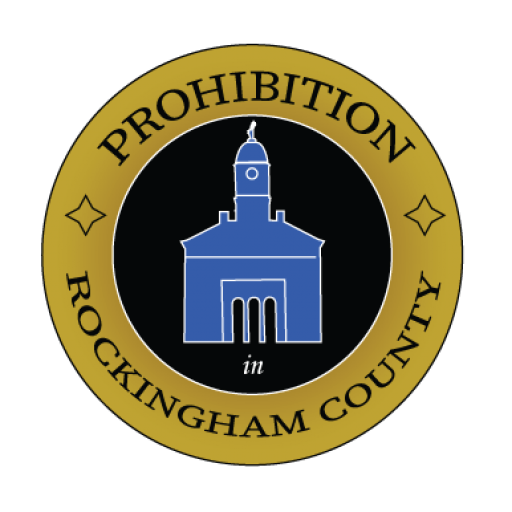September 15, 1914. Daily News Record.
“The Revenuers are coming”
Bettie Gooden called out “The Revenuers are Coming!” after looking out her window to see what was causing the chickens to “cackle.”
Gooden and her family lived in “Brown’s Gap” right outside of Grottoes, Va, at the “top of the Blue Ridge Mountain” in May of 1923. The
The families were unaware of the approaching Sheriff and Federal Agent.
The Raid on “Brown Cove”
Rockingham Sheriff W.L. Dillard, three deputies, and Federal Revenue Agent J.L.
Dirting approached a cluster of three homes located in “Brown Cove” at the “top of the
Blue Ridge Mountain” near Grottoes on August 2nd, 1923. Two of the homes
Gooden lived nearby with his wife Betty. As the officers approached the homes
The next moments were chaotic. Alerted by her chickens, Betty Gooden, looked out
neighbors a chance at escape, she called out “the revenues are coming!” In the
The Trial: Uncovered
Another feature of Rockingham’s experience comes from the transcripts of the jurytrial that followed the arrests that day. Kinship and community ties shaped thetestimony of the suspects and, it seems, the verdict of the jury. Nearly all of thedefendants provided an alibi or claimed ignorance of the moonshine operation.Instead, Lucy Rosson, took all responsibility for the operation of the stills,claiming “there was no one running those stills but me.”
During cross-examination, prosecutors questioned how she could have operated the stills on her own, Lucy defiantly repeated she was the only one who knew about
the stills. Finally, in exasperation with the questioning, she retorted “I done told
you that there was no one running them stills but me, and I ain’t going to tell you
no more.”
Lucy’s attempts to protect her family ultimately failed. The jury found all ten
individuals guilty. Lucy was found guilty and sentenced to four months in jail and
fined $200 dollars. Yet, the court did not penalize her for lying under oath,
which could indicate that local officials were unwilling to directly punish her attempt to protect her family.
Using the Evidence
Historians and ethnographers acknowledge that family and community was an
essential element of
moonshiners. Historian Wilbur R. Miller demonstrates the ubiquitous role family and community played in facilitating the rise of moonshining in his book Revenuers and Moonshiners. Sometimes the act of defending family and loved ones ran to the extreme. In 1881 the Kentucky woman Susan Van Meter “jumped from a second-second story window, running two miles in her nightgown, to warn John[her lover] that a pose was after him.”
Although Lucy Rosson and Susan
Van Meter lived in different regions and at different times, their stories
demonstrate the lasting importance of family and community protection for
moonshiners.
Finally, these records in general and the Rosson case in particular, help test the validity of such historical memory and the transmission of history by family lore.
In her master’s thesis, Moonshining in Rockingham County: A case study on oral
traditions and folkways Tiffany W. Cole demonstrates that local folklore
remembers moonshining as “[a] practice deemed illegal by the federal
government [and] is one that has been generally accepted, if not celebrated, by
many community members in Rockingham County.” Indeed, in rural cash-poor
environments, distilling surplus grain was an economic necessity and a cultural
tradition passed down through the generations.
In 2010 Cole interviewed descendants of Rockingham moonshiners, two of
them shard stories from the Prohibition era, 1916-1933. Peggy Shifflett, daughter
and granddaughter of a moonshining family, recalled, “everybody was making
[moonshine] except for one family, and they were bootlegging it.” Grottoes
resident Tammy Losh recalled that her “[E]x-husband, [and] his grandfather was
a moonshiner [sic]. And he had five children, so to support his family he made
moonshine. That’s what they did.”
Validating such recollections can be tricky. Historical documents created by moonshiners during prohibition are exceedingly rare—especially from small-batch illegal distillers. They rarely keep account books or other papers. The court records in this collection preserve for us—in testimony, affidavits, and witness accounts taken at the time—the words and actions of some of the participants. And when combined with oral histories taken later support or challenge our understanding of the history of moonshining. In this example, the sources suggest that the traditional family-oriented nature of moonshining in the Shenandoah Valley did indeed continue well into the twentieth century. While Prohibition certainly made moonshine a practical source of income and enticed many to do so purely out of profit.
Take Aways
Moonshining seems to have remained important economically in the cash-poor economy in which many rural mountain residents found themselves. Rockingham County was subject to economic hardships that many rural regions faced in the 1920s well before the Great Depression of the 1930s. This placed those who continued to rely on the economic and cultural functions of moonshine at direct odds with prohibition and its advocates, who viewed alcohol as nothing more than a destructive indulgence
and, in the case of Lucy Rosson, the jury seemed to acknowledge the role of
kinship in their efforts to enforce Prohibition.
Commonwealth v. Samuel Rosson et al.
Recorded testimony of Federal Prohibition Agent, J.L. Dirting.
Recorded testimony of Rockingham Sheriff W.L. Dillard.
Recorded testimony of Lucy Rosson.
The jury’s guilty verdict





